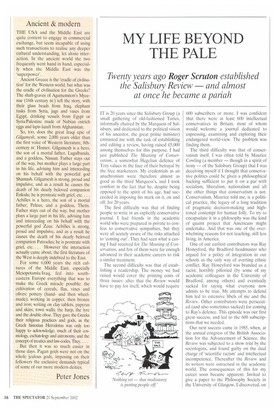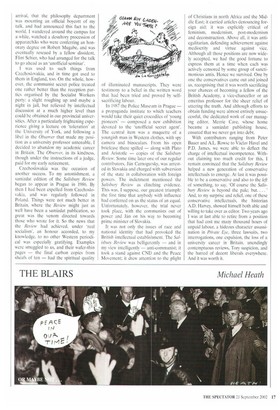MY LIFE BEYOND THE PALE
Twenty years ago Roger Seruton established
the Salisbury Review — and almost at once he became a pariah
IT is 20 years since the Salisbury Group (a small gathering of old-fashioned Tories, informally chaired by the Marquess of Salisbury, and dedicated to the political vision of his ancestor, the great prime minister) entrusted me with the task of establishing and editing a review, having raised £5,000 among themselves for this purpose. I had just published The Meaning of Conservatism, a somewhat Hegelian defence of Tory values in the face of their betrayal by the free marketeers. My credentials as an anachronism were therefore almost as good as the third Marquess's, and I took comfort in the fact that he, despite being opposed to the spirit of his age, had succeeded in imposing his mark on it, on and off. for 20 years.
The first difficulty was that of finding people to write in an explicitly conservative journal. I had friends in the academic world who were prepared in private to confess to conservative sympathies, but they were all acutely aware of the risks attached to 'coming out'. They had seen what a caning I had received for The Meaning of Conservatism, and few of them were far enough advanced in their academic careers to risk a similar treatment.
The second difficulty was that of establishing a readership. The money we had raised would cover the printing costs of three issues: after that the Review would have to pay for itself, which would require
600 subscribers or more. I was confident that there were at least 600 intellectual conservatives in Britain, most of whom would welcome a journal dedicated to expressing, examining and exploring their endangered world-view. The problem was finding them.
The third difficulty was that of conservatism itself. I was often told by Maurice Cowling (a member — though in a spirit of irony — of the Salisbury Group) that I was deceiving myself if I thought that conservative politics could be given a philosophical backing sufficient to put it on a par with socialism, liberalism, nationalism and all the other things that conservatism is not. Conservatism, Maurice told me, is a political practice, the legacy of a long tradition of pragmatic decision-making and hightoned contempt for human folly. To try to encapsulate it in a philosophy was the kind of quaint project that Americans might undertake. And that was one of the overwhelming reasons for not teaching, still less living, in America.
One of our earliest contributors was Ray Honeyforcl, the Bradford headmaster who argued for a policy of integration in our schools as the only way of averting ethnic conflict. Ray Honeyford was branded as a racist, horribly pilloried (by some of my academic colleagues in the University of Bradford, among others) and eventually sacked for saying what everyone now admits to be true. My attempts to defend him led to extensive libels of me and the Review. Other contributors were persecuted (and also sometimes sacked) for coming to Ray's defence. This episode was our first great success, and led to the 600 subscriptions that we needed.
Our next success came in 1985, when, at the annual congress of the British Association for the Advancement of Science, the Review was subjected to a show trial by the sociologists, and found guilty on the dual charge of 'scientific racism' and intellectual incompetence. Thereafter the Review and its writers were ostracised in the academic world. The consequences of this for my career soon became apparent. Invited to give a paper to the Philosophy Society in the University of Glasgow, I discovered, on
arrival, that the philosophy department was mounting an official boycott of my talk, and had announced this fact to the world. I wandered around the campus for a while, watched a desultory procession of apparatchiks who were conferring an honorary degree on Robert Mugabe, and was eventually rescued by a fellow dissident, Flint Schier, who had arranged for the talk to go ahead as an 'unofficial seminar'.
I was used to such things from Czechoslovakia, and in time got used to them in England, too. On the whole, however, the communist secret police treated one rather better than the reception parties organised by the Socialist Workers party: a slight roughing up and maybe a night in jail, but relieved by intellectual discussion at a much higher level than could be obtained in our provincial universities. After a particularly frightening experience giving a lecture on 'toleration' at the University of York, and following a libel in the Observer that made my position as a university professor untenable, I decided to abandon my academic career in Britain. The Observer, in its kindness, though under the instructions of a judge, paid for my early retirement.
Czechoslovakia was the occasion of another success. To my astonishment, a samizdat edition of the Salisbury, Review began to appear in Prague in 1986. By then I had been expelled from Czechoslovakia, and was regularly followed in Poland. Things were not much better in Britain, where the Review might just as well have been a samizdat publication, so great was the venom directed towards those who wrote for it. So the news that the Review had achieved, under 'real socialism', an honour accorded, to my knowledge, to no other Western periodical was especially gratifying. Examples were smuggled to us, and their wafer-thin pages — the final carbon copies from sheafs of ten — had the spiritual quality
of illuminated illuminated manuscripts. They were testimony to a belief in the written word that had been tried and proved by selfsacrificing labour.
In 1987 the Police Museum in Prague — a propaganda institute to which teachers would take their quiet crocodiles of 'young pioneers' — composed a new exhibition devoted to the 'unofficial secret agent'. The central item was a maquette of a youngish man in Western clothes, with spy camera and binoculars. From his open briefcase there spilled — along with Plato and Aristotle — copies of the Salisbury Review. Some time later one of our regular contributors, Jan Carnogursky, was arrested in Slovakia and charged with subversion of the state in collaboration with foreign powers. The indictment mentioned the Salisbury Review as clinching evidence. This was, I suppose, our greatest triumph: the first time that anybody with influence had conferred on us the status of an equal. Unfortunately, however, the trial never took place, with the communists out of power and Jan on his way to becoming prime minister of Slovakia.
It was not only the issues of race and national identity that had provoked the British intellectual establishment. The Salisbury Review was belligerently — and in my view intelligently — anti-communist; it took a stand against CND and the Peace Movement; it drew attention to the plight
of Christians in north Africa and the Middle East; it carried articles denouncing foreign aid; it was explicitly critical of feminism, modernism, post-modernism and deconstruction. Above all, it was antiegalitarian, defending achievement against mediocrity and virtue against vice. Although all those positions are now widely accepted, we had the good fortune to express them at a time when each was actively censored by some group of sanctimonious antis. Hence we survived. One by one the conservatives came out and joined us, recognising that it was worth sacrificing your chances of becoming a fellow of the British Academy, a vice-chancellor or an emeritus professor for the sheer relief of uttering the truth. And although efforts to obtain funding were almost entirely unsuccessful, the dedicated work of our managing editor, Merrie Cave, whose home became a samizdat publishing house, ensured that we never got into debt.
With contributors ranging from Peter Bauer and A.L. Rowse to Vaclav Havel and P.D. James, we were able to deflect the charge of intellectual incompetence. Without claiming too much credit for this, I remain convinced that the Salisbury Review helped a new generation of conservative intellectuals to emerge. At last it was possible to be a conservative and also to the left of something, to say. 'Of course the Salisbury Review is beyond the pale; but....' And, to my surprise and relief, one of these conservative intellectuals, the historian A.D. Harvey, showed himself both able and willing to take over as editor. Two years ago I was at last able to retire from a position that had cost me many thousand hours of unpaid labour, a hideous character assassination in Private Eye, three lawsuits, two interrogations, one expulsion, the loss of a university career in Britain, unendingly contemptuous reviews, Tory suspicion, and the hatred of decent liberals everywhere. And it was worth it.











































































 Previous page
Previous page